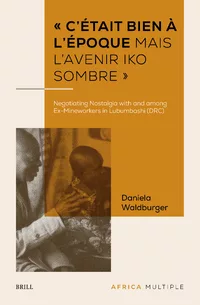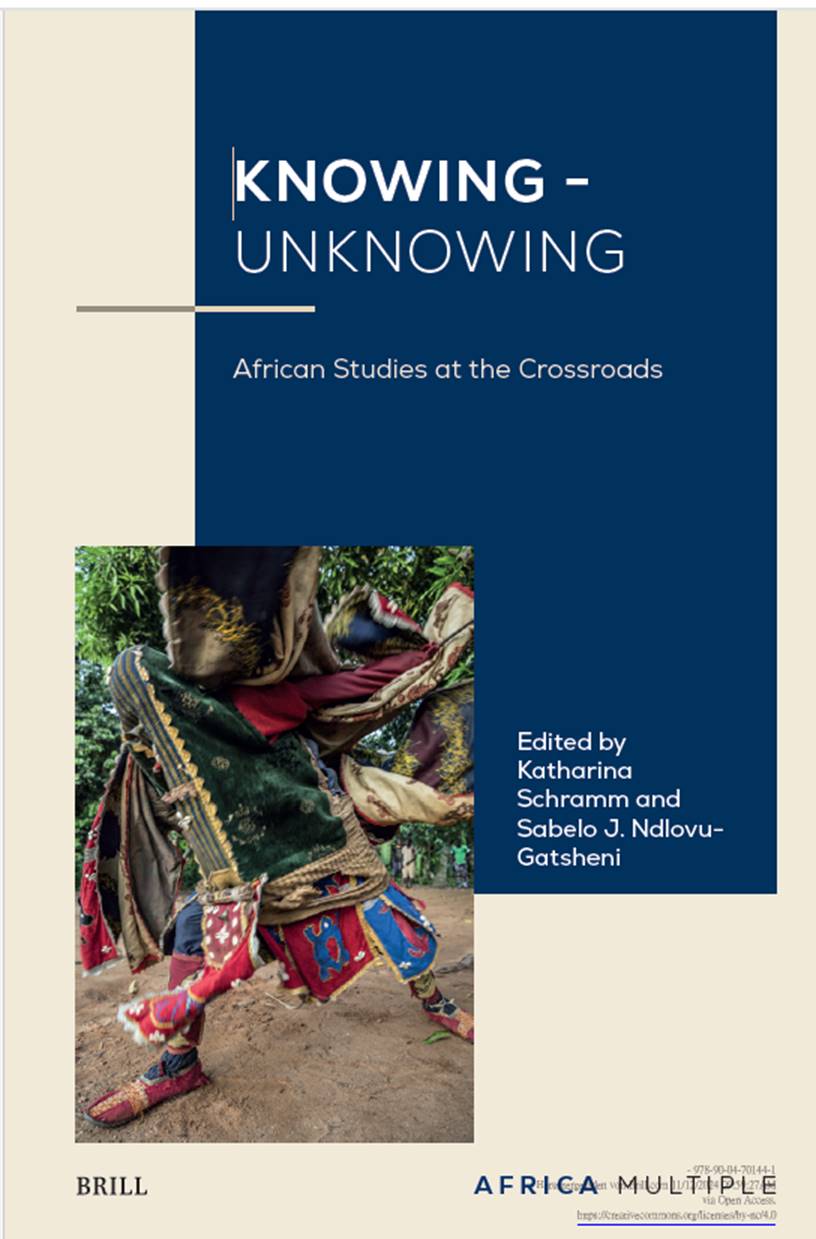Africa Multiple Cluster Series: Brill
Africa Multiple: Studies of Africa and its Diasporas
In mid-2021, the Africa Multiple Cluster of Excellence at the University of Bayreuth, Germany, has established the Africa Multiple book series with Brill Academic Publishers:

The overarching aim of the Africa Multiple book series is to advance the study of Africa and its diasporas through publishing multidisciplinary research. The peer-reviewed series is designed to overcome existing power imbalances in the production and transmission of knowledge in African Studies. Encouraging critical reflections on area studies, the series seeks to set new standards for collaborative research in the field, informed by an understanding of Africa as multiple that emphasizes relationality and reflexivity as its main conceptual approaches. These approaches take center stage in the Africa Multiple Cluster of Excellence at the University of Bayreuth, Germany, which was established in early 2019 with the aim of reconfiguring African Studies in both structural and theoretical terms. It is conceived as a transcontinental network comprising five locations: apart from Bayreuth, these are the African Cluster Centers at Moi University (Eldoret, Kenya), Rhodes University (Makhanda, South Africa), the University of Lagos (Nigeria), and Joseph Ki- Zerbo University (Ouagadougou, Burkina Faso).
The series invites contributions from diverse fields and disciplines, ranging from social sciences, cultural studies and humanities to law, geography and beyond. As part of the programmatic objective of reconfiguring African Studies, we include publications in English as well as other academic languages (such as French, German, Kiswahili, Arabic, and Portuguese).
If you are working on a book that would be suitable for this series, please do not hesitate to contact BRILL Editor Franca de Kort (franca.dekort@brill.com)
For more information see brill.com

C’était bien à l’époque mais l’avenir iko sombre
Why do former mineworkers in Lubumbashi (DRC) remember exploitative working conditions and measures to control their private lives with nostalgia? Building on their 'objects of loss', this book answers this question, foregrounding the voice of so-called 'Départs Volontaires’. The study combines linguistics, anthropology, and archives research to explore what ex-mineworkers regard as material and emotional 'objects of loss'. The book advocates for a participatory research framework called ‘the baraza web’ which merges the researcher’s perspective with the standpoint of the ex-miners to create an alternative archive and to show that power relations within a research setting need constant questioning.
Daniela Waldburger, PhD (2012), and Habilitation (2023), University of Vienna, is a Senior Lecturer in Swahili Studies and African Studies. Her publications cover language and power (mis)use, language and violence, participatory research methods, Swahili language and literature, Swahili varieties, and transnational multilingual language use.

Knowing - Unknowing: African Studies at the Crossroads
This book emerges at a time when critical race studies, postcolonial thought, and decolonial theory are under enormous pressure as part of a global conservative backlash. However, this is also an exciting moment, where new horizons of knowledge appear and new epistemic practices (e.g. symmetry, collaboration, undisciplining) gain traction. Through our critical engagements with structural, relational, and personal aspects of knowing and unknowing we work towards a greater multiplicity of knowledges and practices. Calling into question the asymmetrical global economy of knowledge and its uneven division of intellectual labour, our interdisciplinary volume explores what a decolonial horizon could entail for African Studies at the crossroads.
Volume Editors: Katharina Schramm and Sabelo J. Ndlovu-Gatsheni

Of Worlds and Artworks: A Relational View on Artistic Practices from Africa and the Diaspora
The present volume brings together contributions which explore artworks – including literature, visual arts, film and performances – as dynamic sites of worlding. It puts emphasis on the processes of creating or doing worlds, implying movement as opposed to the boundary drawing of area studies. From such a processual perspective, Africa is not a delineated area, but emerges in a variety of relations which can reach across the continent, but also the Indian Ocean, the Atlantic or Europe.
Contributors are: Thierry Boudjekeu, Elena Brugioni, Ute Fendler, Sophie Lembcke, Gilbert Ndi Shang, Samuel Ndogo, Duncan Tarrant, Kumari Issur, CJ Odhiambo, Michaela Ott, Peter Simatei, Clarissa Vierke, Chinelo J. Enemuo.

'Entré en tant que cousin, sorti en tant que gendarme'
« Entré en tant que cousin, sorti en tant que gendarme ». Cette anecdote révèle le paradoxe identitaire aux Comores et le drame ‘migratoire’ qui se déroule dans l’Archipel depuis l’instauration arbitraire du Visa Balladur en 1995. L’île de Mayotte, officiellement française, est taxée de « plus grand cimetière marin du monde. » Comment des œuvres d’imagination sur la « migration » d’Anjouan vers Mayotte peuvent-elles constituer une thérapie collective et une intervention sociale ? Cet ouvrage répond entre autres à cette question en analysant 18 textes et en associant études littéraires, anthropologie, sociologie, histoire et droit international.
« He came as a cousin and left as a gendarme. » This anecdote expresses the identity paradox in the Comoros and the ‘migration’ drama that has been happening in the Archipelago since the arbitrary introduction of the Balladur Visa in 1995. Mayotte that is ‘officially’ French has been labelled “the biggest marine graveyard in the world”. How can works of imagination on “migration” from Anjouan to Mayotte constitute a kind of collective social therapy and social intervention? This book answers this question (among others) by studying 18 works, and combining literary studies with anthropology, sociology, history and international law.

Field Station Bahia
Brazil in the Work of Lorenzo Dow Turner, E. Franklin Frazier and Frances and Melville Herskovits, 1935-1967
This book offers a new perspective on the making of Afro-Brazilian, African-American and African studies through the interrelated trajectory of E. Franklin Frazier, Lorenzo Dow Turner, Frances and Melville Herskovits in Brazil. The book compares the style, network and agenda of these different and yet somehow converging scholars, and relates them to the Brazilian intellectual context, especially Bahia, which showed in those days much less density and organization than the US equivalent. It is therefore a double comparison: between four Americans and between Americans and scholars based in Brazil.
Link to publication
Click to see the flyer
About the African Multiple Series with Brille Academic Publishers
In mid-2021, the Africa Multiple Cluster of Excellence at the University of Bayreuth, Germany, has established the Africa Multiple book series with Brill Academic Publishers. The overarching aim of the series is to advance the study of Africa and its diasporas through offering a forum for multidisciplinary research. The peer-reviewed series is designed to overcome existing power imbalances in the production and transmission of knowledge in African Studies. Encouraging critical reflections on area studies, the series seeks to set new standards for collaborative research in the field, informed by an understanding of Africa as multiple that emphasizes relationality and reflexivity as its main conceptual approaches. These approaches take center stage in the Africa Multiple Cluster, which was established in 2019 with the aim of reconfiguring African Studies in both structural and theoretical terms. The Cluster is conceived as a transcontinental network comprising five locations: apart from Bayreuth, these are the African Cluster Centers at Moi University (Eldoret, Kenya), Rhodes University (Makhanda, South Africa), the University of Lagos (Nigeria), and Joseph Ki- Zerbo University (Ouagadougou, Burkina Faso). The series invites contributions from diverse fields and disciplines, ranging from social sciences, cultural studies and humanities to law, geography and beyond. As part of the programmatic objective of reconfiguring African Studies, we include publications in English as well as other academic languages (such as French, German, Kiswahili, Arabic, and Portuguese).
Series Editors:
- Enocent Msindo, Professor of History, Rhodes University, Makhanda, South Africa
- Rüdiger Seesemann, Professor of Islamic Studies, University of Bayreuth, Germany
Editorial Advisory Board Members:
- Patrícia Godinho Gomes, Visiting Associate Professor of History and African Institutions, Centro de Estudos Afro-Orientais, Universidade Federal da Bahia, Salvador de Bahia, Brazil
- John H. Hanson, Professor of History, Indiana University, Bloomington, IN, USA
- Esmeralda Mariano Professor of Social Anthropology and Gender Studies, Universidade Eduardo Mondlane, Maputo, Mozambique
- Andreas Mehler, Professor of Political Science, Arnold-Bergstraesser-Institut and Merian Institute for Advanced Studies in Africa, Freiburg, Germany
- Godwin Murunga, Development Studies, Executive Secretary of CODESRIA, Dakar, Senegal
- Grace Musila, Professor of Literature, University of the Witwatersrand, Johannesburg, South Africa; Literature
- Céline Thiriot, Professor of Political Science, Sciences Po Bordeaux, France
- For inquiries and submissions, please contact Franca de Kort: Franca.deKort@brill.com
- To find the guidleines for authors, please click here.


